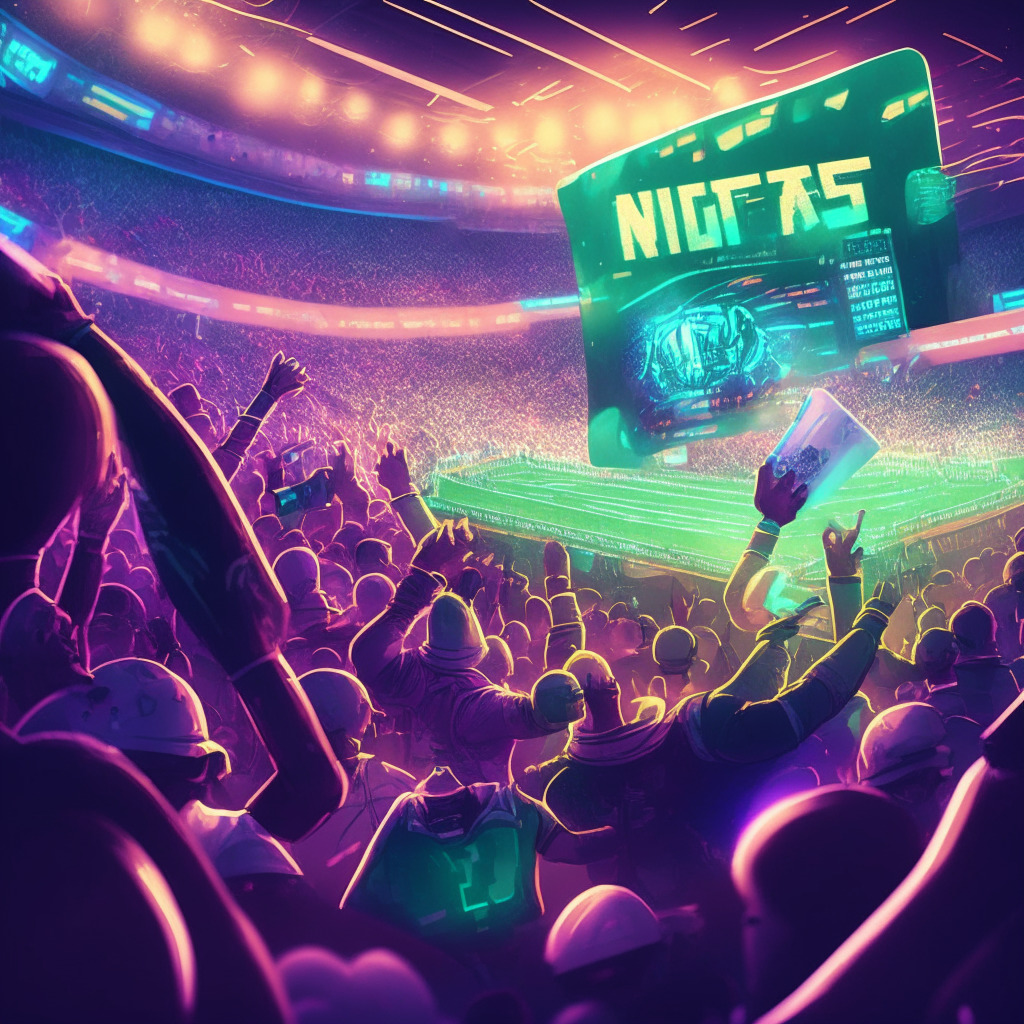The EU proposes “prohibitive” rules to keep unbacked crypto out of the traditional financial system, while Fireblocks expands support for major cloud providers and OKX launches Nitro Spreads feature for OTC institutional liquid market. Digital asset investments surge, but upcoming regulations may impact growth and innovation.
Search Results for: Google'
Expanding Cryptocurrency Custody: Fireblocks Partners with Cloud Giants, Security Concerns Linger
Cryptocurrency custody technology provider Fireblocks has expanded its support to cloud service providers including Amazon Web Services, Google Cloud Platform, Alibaba Cloud, Thales, and Securosus, aiming to cater to banks using on-premise and cloud-based IT infrastructures.
Amazon’s $100M Generative AI Center: Boosting Cloud Services or Raising Privacy Concerns?
Amazon’s cloud unit, AWS, invests $100 million in a generative AI center to enhance cloud infrastructure services capabilities and maintain market leadership. This move aims to bridge the gap between Amazon’s AI experts and clients seeking advanced technology applications, amidst rising competition from Microsoft and Google.
AI’s Impact on Translation Industry: Pros, Cons, and Future Developments
AI-powered translation systems like Neural Machine Translation (NMT) are revolutionizing the translation industry by offering speed, efficiency, and continuous improvement. Although concerns regarding limitations persist, advancements in AI technology promise more accurate and contextually appropriate translations in the future.
PepeCoin vs Dogecoin: Ultimate Memecoin Battle or Passing Trend in Crypto World?
PepeCoin recently gained prominence in the memecoin sector, challenging Dogecoin’s dominance. With native Ethereum integration and a fixed supply, it shows potential for growth, but it must overcome Dogecoin’s first-mover advantage and network dominance to become a mainstream memecoin contender.
NFL Rivals Success: Exploring NFT Integration in Mainstream Gaming and Future Implications
NFL Rivals, a free-to-play game from Mythical Games, stands out with its integration of Non-Fungible Tokens (NFTs) as player cards. Garnering over a million downloads and reaching top spots in app stores, the game successfully introduces users to Web3 and NFT concepts, highlighting the potential of NFT integration in mainstream games and shaping the future of crypto gaming.
Robinhood Acquires X1: A Lifeline Amid Declining Crypto Revenue and User Base
Robinhood acquires credit card startup X1 for $95 million, aiming to diversify its financial services and offset declining user base and crypto trading revenue. The acquisition presents new opportunities, but the venture’s impact on Robinhood’s overall prospects remains uncertain.
Crypto Rewards in Mobile Gaming: Exciting Future or Mere Pocket Change?
Bitcoin payments startup Zebedee has launched ZBD, a feature in its Android app that rewards players with small amounts of Bitcoin for playing over 100 eligible mobile games, due to a partnership with advertising platform Adjoe. The integration of cryptocurrency rewards showcases the potential for blockchain technology and cryptocurrency markets to become prominent in the gaming industry, while also raising questions about the long-term financial viability for players.
The Impact of NLP and AI on Human-Machine Interaction: Opportunities and Challenges Ahead
The rapid advancements in natural language processing (NLP) and artificial intelligence (AI) have transformed interactions between humans and machines, driving applications in customer service, language translation, and content generation. Despite challenges in data acquisition, professional expertise, and workflow integration, AI continues to permeate various industries, reshaping the digital landscape.
Fortune 500 Crypto Adoption Soars Amid Regulatory Pressure: US Losing Ground?
Over 80% of Fortune 500 companies are exploring or deploying Web3 initiatives, despite US regulatory pressure, as per a Coinbase study. The majority of these initiatives involve infrastructure development, supply chain management, data collection, and payment use cases. However, 90% of respondents believe clear rules and regulations are needed to advance adoption.
Meme Coin Rally Continues: Factors, Market Impact, and Potential Dangers
The meme coin rally continues with Pepecoin, Dogecoin, Shiba Inu, and Floki Inu experiencing double-digit increases. Factors fueling this trend include potential exchange listings and new blockchain initiatives. Despite the surge, critics argue meme coins are highly speculative and lack inherent value compared to more advanced cryptocurrencies.
Revival of Gods Unchained: Epic Games Store Launch, Mobile Expansion, and Immutable’s Future Plans
NFT game Gods Unchained is set for a revival in 2023 with its launch on the popular Epic Games Store, attracting a larger audience. Developer Immutable Games Studio plans to introduce new game modes, a major expansion pack, and expand to iOS and Android platforms to enhance user experience and accessibility.
AI Regulation Race: Balancing Innovation with Ethics as Global Powers Act on Legislation
The proposed H.R.4223 bill aims to create a federal commission on AI to develop a comprehensive regulatory strategy for AI technologies. The bipartisan bill follows the introduction of strong UK AI laws and will address potential risks, while ensuring that US technological innovation remains intact.
AI Safety Legislation: Balancing Innovation and Public Trust in the Era of Artificial Intelligence
US Senate Majority Leader Chuck Schumer plans to call for comprehensive legislation regarding AI safety measures, emphasizing bipartisan action from Congress. Addressing safe innovation, privacy, biases, and misinformation, Schumer aims to ensure responsible and secure AI development while maintaining public trust in the technology.
EU AI Act Compliance Crisis: How LLMs Fall Short and the Road to Improvement
A recent Stanford University study reveals a concerning lack of compliance with the EU AI Act among large language models, including GPT-4 and Google’s Bard. Researchers ranked ten major model providers on their adherence to the 12 requirements outlined in the AI Act, finding a pressing need for improvement even among high-scoring providers. The study highlights transparency and accountability as crucial aspects of responsible AI deployment.
Biden’s AI Summit: Balancing Innovation, Regulation, and Blockchain Implications
President Joe Biden is set to meet with AI experts to discuss the future of artificial intelligence and the need for legislation and guidelines. This comes at a time when the U.S. government has yet to establish a comprehensive strategy for AI development and cryptocurrency regulation, while Europe, China, and the United Kingdom have already made progress in these areas. The meeting aims to address concerns on policy, regulation, and balancing innovation with safety and risk mitigation.
Uncovering the Binance Ltd Mystery: Shell Companies in the Crypto World – Legit or Not?
A recent finding revealed Binance Ltd and 2,400 other companies were registered under the same address in the UK. Binance clarified that Binance Ltd was not affiliated with their exchange. Shell companies are notorious for concealing ownership and illegal activities, but they also serve legitimate purposes like privacy protection, tax planning, and real estate investments.
Unmasking the World of Shell Addresses: Binance’s UK Utility Closet and the Transparency Debate
Binance Ltd, part of one of the world’s largest crypto exchanges, shares a UK-registered address with 2,403 active companies in a small Suffolk town. This “utility closet” tactic, used to provide a “believable business location,” raises questions about transparency and ethical implications in the crypto industry.
Improbable’s MSquared: Fueling the Future of the Metaverse or Overpromising?
Improbable’s MSquared, a metaverse creation engine, is gaining interest through its early access and open-sourcing of Metaverse Markup Language. With support from tech giants like Google, Nvidia, and Dolby, MSquared aims to promote development of novel business models and enable unique experiences within a network of metaverses.
SEC vs Binance.US Showdown: Unearthing Past Statements and Facing New Legislation
The U.S. SEC’s intention to freeze Binance.US’s assets faced a setback as Judge Amy Berman Jackson advised bilateral negotiations. Meanwhile, HKMA urges banks to accept crypto exchanges as clients, and the European Parliament passes the EU Artificial Intelligence Act, impacting governance of AI technologies.
7 ChatGPT Alternatives: Exploring the Future of Conversational AI Platforms
Explore seven ChatGPT alternatives, including Google Bard, Bing AI, ChatSonic, You.com, Jasper AI, Perplexity AI, and GitHub Copilot, each offering unique features for different natural language processing tasks. Catering to diverse user needs, find the best AI-driven tool to suit your requirements.
AI’s Promising Future vs Ethical Implications: Striking the Right Balance for Sustainability
This article discusses the history and advancements of artificial intelligence (AI) and its integration into various aspects of our lives while addressing ethical and practical implications such as data privacy, biases, and job displacement. It highlights the importance of finding a balance between AI benefits and potential challenges.
Synquote: Revolutionizing DeFi Options with Undercollateralized Trading & Social Logins
Decentralized finance platform Synquote launched, utilizing social logins and undercollateralized trading to attract liquidity providers. Handling large trades with less slippage, Synquote uses an off-chain, peer-to-peer request for quote protocol for better flexibility in orders and offering undercollateralized trades to appeal to large institutions, while ensuring conservative risk-management practices.
EU AI Act: Balancing Innovation and Ethics in Artificial Intelligence Regulation
The European Parliament recently passed the EU AI Act, aiming to promote human-centric and trustworthy AI while protecting health, safety, and fundamental rights. The act restricts certain AI services and products, including biometric surveillance and predictive policing, while allowing generative AI models like OpenAI’s ChatGPT and Google’s Bard, provided they are clearly labeled. The challenge lies in balancing innovation and safety in AI development.
Binance Supports Terra Classic Upgrade: Pros, Cons, and Market Impact
Binance and other major crypto exchanges support Terra Classic’s v2.1.1 upgrade, which brings its blockchain to parity with Terra 2.0 and other Cosmos chains. Despite minor setbacks awaiting a Google Chrome extension update, the upgrade signals potential for advanced decentralized applications and a positive market sentiment for the network’s future.
Atomic Wallet Hack: Unveiling Security Flaws and $100M Lost to Cybercrime
The Atomic Wallet, with over 5,500 wallets affected, experienced a $100 million hack compromising various cryptocurrencies. Blockchain experts suspect North Korean group Lazarus may be responsible. This marks the increasing vulnerability in the crypto world, highlighting the importance of security features and vigilance when choosing wallets and services.
SEC’s Cryptocurrency Dilemma: Emails Reveal Internal Debate on Ether, Ripple and Securities Status
Newly released court documents suggest that former SEC Division Director William Hinman and other SEC officials may have experienced internal pressure regarding their views on whether cryptocurrencies, like Ethereum’s ether, are considered securities. The ongoing Ripple v. SEC case highlights the complexities and nuances separating various cryptocurrencies, emphasizing that regulatory decisions can’t be made based on simple comparisons alone.
UK Secures Early Access to AI Models: Impact on Global Tech Race and Crypto Regulations
The UK is set to receive early access to AI models from Google DeepMind, OpenAI, and Anthropic, as announced by British Prime Minister Rishi Sunak. This move aims to foster cutting-edge safety research, promote global alliance, and invest in AI and quantum technologies, potentially providing the UK with a competitive edge in AI innovation.
Taxbit Layoffs Amid Expansion Plans: Analyzing the Crypto Industry’s Struggle with Regulation
Taxbit, a crypto tax compliance software company, laid off 80 workers (40% of its staff) and announced the departure of CEO Austin Woodward. Lindsey Argalas, a former Intuit executive, replaced him. The company plans to re-expand in the UK and EU amidst a more complex regulatory environment and growing taxation focus in the crypto space.
Indian AI Startups Challenging the Giants: Hopeless or a Path to Innovation?
OpenAI CEO Sam Altman’s comment, seemingly dismissing Indian startups’ ability to compete with American AI companies, sparked debate among local business leaders. However, Altman later clarified his statement and expressed confidence in Indian startups’ potential to contribute significantly to the world of AI and technology.
China’s Role in AI Regulation: Balancing Innovation and Global Security Concerns
OpenAI CEO Sam Altman emphasizes the importance of including China in shaping AI regulations due to its wealth of AI talent. Amid growing national security concerns, international collaboration is crucial for addressing challenges posed by AI advancements, ensuring safety and fostering technological innovation.
SEC Summer Crackdown on Binance & Coinbase: Legal Clarity or Market Fiasco?
The SEC has targeted Binance and Coinbase in its recent crypto crackdown, resulting in 13 charges against Binance and accusations of unregistered securities offerings against Coinbase. Despite ongoing uncertainty, these events may bring desired legal clarity to the industry.































